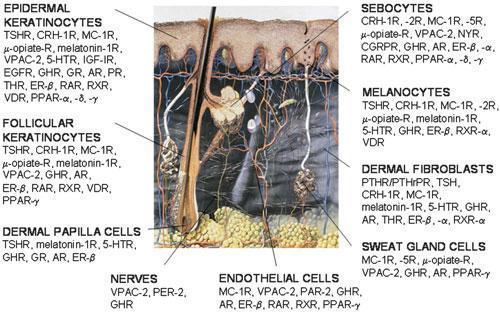General Orange
Member
Alright, I think Ketoconzole needs a little higher dose to antagonize cortisol ? [100 μM] than it needs to antagonize androgen receptors [6.4±1.8 (SE) × 10-5M ]. Not sure, I hope I got this right, see below.
But what I find more interesting...
Ketoconazole and Miconazole Are Antagonists of the Human Glucocorticoid Receptor
Ketoconazole and Miconazole Are Antagonists of the Human Glucocorticoid Receptor: Consequences on the Expression and Function of the Constitutive Androstane Receptor and the Pregnane X Receptor
Miconazol is also an cortisol antagonist and is actually more interesting than Ketoconzole, coz it has lower molecular weight / smaller molecule, 416.127 g/mol, so can penetrate the skin barrier better than Ket [531.431 g/mol] but is not an androgenic antagonist. So would be able to reach deeper and more Glucocorticoid receptors. see image and this also comes in antifungal shampoo hehe.

Figure 1. Hormone receptors detected as being active in human skin cells. PTHR/PTHrPR, parathyroid hormone receptor/parathyroid hormone-related peptide receptor; TSHR, thyroid-stimulating hormone receptor; CRH-1R, -2R, corticotropin-releasing hormone receptors types 1 and 2; MC-1R, -2R, -5R, melanocortin receptor types 1, 2 and 5; µ-opiate-R, µ-opiate receptors; melatonin-1R, melatonin receptor type 1; VPAC-2, vasoactive intestinal popypeptide receptor type 2; NYR, neuropeptide Y receptor; CGRPR, calcitonin gene-related peptide receptor; 5-HTR, serotonin receptors (5-hydroxytryptamine receptors); PAR, proteinase-activated receptors; IGF-IR, insulin/insulin-like growth factor I receptor; GHR, growth hormone receptor; GR, glucocorticoid receptor; AR, androgen receptor; PR, progesterone receptor; THR, thyroid hormone receptors (isotypes a1 and b1); ER-β, -α, estrogen receptor types β and α; RAR, retinoic acid receptors; RXR, retinoid X receptors; RXR-α, retinoid X receptor type α; VDR, vitamin D (calcitriol) receptor; PPAR-α, -δ, -γ, peroxisome proliferator-related receptors types α, β, γ.
But what I find more interesting...
Ketoconazole and Miconazole Are Antagonists of the Human Glucocorticoid Receptor
Ketoconazole and Miconazole Are Antagonists of the Human Glucocorticoid Receptor: Consequences on the Expression and Function of the Constitutive Androstane Receptor and the Pregnane X Receptor
Miconazol is also an cortisol antagonist and is actually more interesting than Ketoconzole, coz it has lower molecular weight / smaller molecule, 416.127 g/mol, so can penetrate the skin barrier better than Ket [531.431 g/mol] but is not an androgenic antagonist. So would be able to reach deeper and more Glucocorticoid receptors. see image and this also comes in antifungal shampoo hehe.

Figure 1. Hormone receptors detected as being active in human skin cells. PTHR/PTHrPR, parathyroid hormone receptor/parathyroid hormone-related peptide receptor; TSHR, thyroid-stimulating hormone receptor; CRH-1R, -2R, corticotropin-releasing hormone receptors types 1 and 2; MC-1R, -2R, -5R, melanocortin receptor types 1, 2 and 5; µ-opiate-R, µ-opiate receptors; melatonin-1R, melatonin receptor type 1; VPAC-2, vasoactive intestinal popypeptide receptor type 2; NYR, neuropeptide Y receptor; CGRPR, calcitonin gene-related peptide receptor; 5-HTR, serotonin receptors (5-hydroxytryptamine receptors); PAR, proteinase-activated receptors; IGF-IR, insulin/insulin-like growth factor I receptor; GHR, growth hormone receptor; GR, glucocorticoid receptor; AR, androgen receptor; PR, progesterone receptor; THR, thyroid hormone receptors (isotypes a1 and b1); ER-β, -α, estrogen receptor types β and α; RAR, retinoic acid receptors; RXR, retinoid X receptors; RXR-α, retinoid X receptor type α; VDR, vitamin D (calcitriol) receptor; PPAR-α, -δ, -γ, peroxisome proliferator-related receptors types α, β, γ.
Ketoconazole reduced [3H]dexamethasone binding to hGR in a concentration-dependent manner with an IC50 value of approximately 100 μM. These results suggest that ketoconazole interacts with hGR in such a way as to inhibit dexamethasone binding. In sum, the results presented in Figs. 1, 2, 3, 4 suggest that ketoconazole is an antagonist of hGR.
"Fifty percent displacement of [3H]R1881 binding to AR was achieved by 6.4±1.8 (SE) × 10-5M ketoconazole. Additional binding studies performed with ketoconazole in the presence of increasing amounts of [3H]R1881 showed that the interaction of ketoconazole with AR was competitive when the data were analyzed by the Scatchard method.
It should be noted, however, that the dose of ketoconazole required for 50% Occupancy of the androgen receptor is not likely to be achieved in vivo, at least in plasma.
Finally, androgen binding studies performed with other imidazoles, such as clotrimazole, miconazole, and fluconozole, revealed that in this class of compounds only ketoconazole appears to interact with the androgen receptor."
Last edited:
